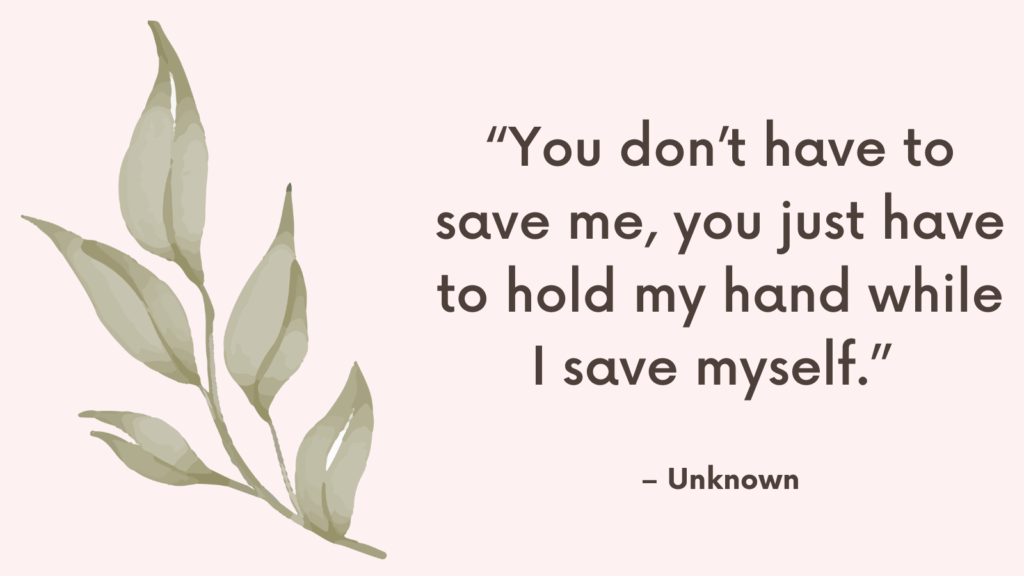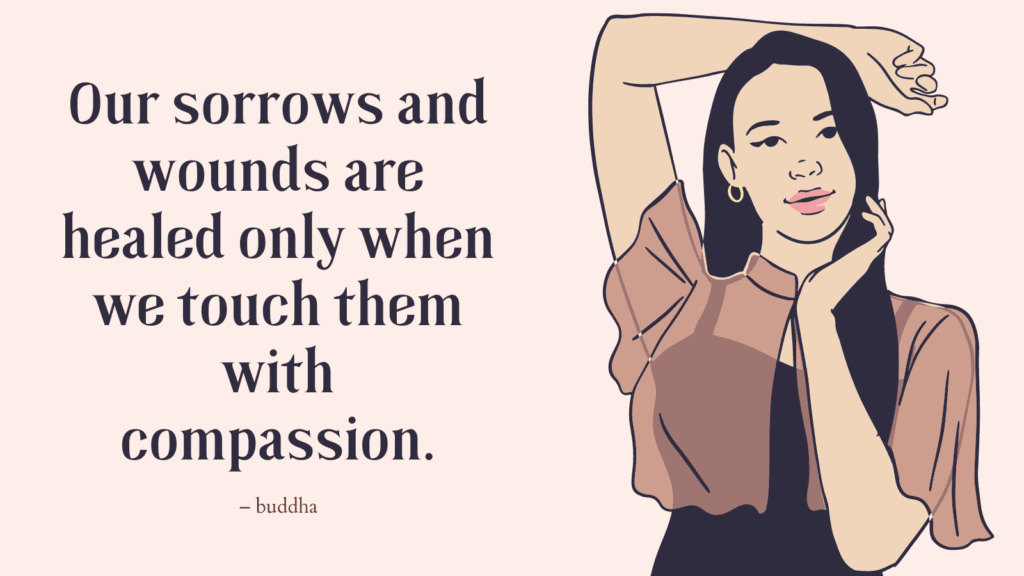In this post, you’ll learn what to do when someone with PTSD pushes you away.
What Is PTSD?
PTSD stands for Post-Traumatic Stress Disorder, which is a mental health condition that can develop in individuals who have experienced or witnessed a traumatic event.
Trauma can be defined as a distressing or life-threatening event such as physical or sexual assault, natural disasters, accidents, combat, or any other event that overwhelms a person’s ability to cope.
The symptoms of PTSD typically fall into four main categories:
1. Intrusive thoughts and memories: This includes experiencing intrusive and distressing memories of the traumatic event, recurrent nightmares, flashbacks, and intense psychological or physiological reactions when exposed to reminders of the trauma.
2. Avoidance: People with PTSD may try to avoid any reminders of the traumatic event, such as avoiding certain places, people, or activities, as well as avoiding talking or thinking about the event itself.
3. Negative changes in thinking and mood: This involves negative thoughts and beliefs about oneself or the world, feelings of detachment or estrangement from others, a diminished interest in activities, difficulty experiencing positive emotions, and persistent negative emotions like guilt, shame, anger, or fear.
4. Hyperarousal: Individuals with PTSD may experience an increased state of arousal, including hypervigilance, difficulty sleeping, irritability, outbursts of anger, difficulty concentrating, and an exaggerated startle response.
These symptoms can significantly interfere with a person’s daily functioning, relationships, and overall quality of life.
It’s important to note that not everyone who experiences trauma will develop PTSD, as individual vulnerability and resilience, as well as the severity and duration of the trauma, can influence its development.
Related: Do I Have Trauma? Top 4 Practical Exercises To Support Your Trauma Healing
Why Would Someone With PTSD Push You?
When someone with PTSD pushes others away, it’s important to recognize that it is not a personal attack but rather a defense mechanism often associated with their condition. Here are a few reasons why this might happen:
1. Hyperarousal: People with PTSD may experience heightened levels of anxiety and hypervigilance. In order to protect themselves from potential triggers or perceived threats, they may push others away to create distance and maintain a sense of control.
2. Trust issues: Trauma can shatter a person’s trust in others, leading to difficulties in forming and maintaining relationships. This can cause individuals with PTSD to push others away as a way to prevent anticipated betrayal, rejection, or harm.
3. Emotional numbness: Some individuals with PTSD may struggle with emotional regulation. They might withdraw or push others away in an attempt to avoid feeling vulnerable or overwhelmed by intense emotions that can be triggered by certain situations or people.
4. Fear of triggering memories: Certain people, places, or situations may act as reminders of the traumatic event, causing distress and emotional upheaval. To avoid potential triggers, someone with PTSD may choose to distance themselves from others.
It’s essential to approach individuals with understanding, patience, and empathy.
Recognize that their actions may stem from their trauma and not from any personal fault or intention to harm.
Related: Why Is Trauma Therapy So Hard? (+Best Trauma Healing Exercises To Support Your Recovery)
What to Do When Someone with PTSD Pushes You Away?
When someone with post-traumatic stress disorder (PTSD) pushes you away, it can be challenging to navigate their boundaries while still offering support.
Here are some suggestions on what to do in such situations:
1. Educate yourself
By understanding the symptoms, triggers, and challenges faced by individuals with PTSD, you can develop a greater empathy and better support them.
Educating yourself can be done through reading books, attending workshops, or seeking information from reputable sources online.
Additionally, learning about different treatment options for PTSD can be beneficial both for you and the person experiencing it.
Therapies like Cognitive Behavioral Therapy (CBT), Eye Movement Desensitization and Reprocessing (EMDR), and medication management can help individuals manage and reduce their symptoms.
By understanding these treatment methods, you can suggest appropriate resources or professionals who specialize in helping those with PTSD.
Related: Best 10 Books For Healing Trauma
2. Respect their boundaries
Understanding that their behavior is not a reflection of your worth as a person is crucial.
People with PTSD may experience triggers or episodes that can make them feel overwhelmed or anxious, causing them to withdraw from others.
By respecting their need for space and not taking it personally, you demonstrate empathy and help maintain a safe environment for them to heal.
It is essential to remember that everyone copes with trauma differently, and their reactions may vary.
Instead of pushing for closeness, allow the person with PTSD to dictate the pace of the relationship.
This means being patient and understanding if they need time alone or if they decline social invitations.
Respect their boundaries by not prying into their personal experiences or trying to force them into discussing their trauma.
Offering your support without pressure or judgment can be incredibly comforting.
Related: Best Support Groups For Emotional Abuse (Online & In Person)
3. Communicate openly
Communicating openly can make a significant difference in rebuilding trust and maintaining a supportive relationship.
Firstly, it is important to recognize that the person may be experiencing intense emotions and fears that make them isolate themselves or push others away.
Avoid taking their actions personally and instead try to empathize with their struggle.
Secondly, gently express your readiness to listen and offer support when they feel comfortable.
Let them know that you are there for them without judgment or pressure.
Actively listening and validating their feelings can help them feel heard and understood.
Related: How To Validate Someone’s Feelings Without Agreeing? (+Examples of Validating Statements)
4. Avoid taking it personally
It’s important to remember that their actions are not a reflection of your worth or relationship with them, but rather a coping mechanism they have developed to manage their symptoms.
Instead of being hurt or offended, try to understand their perspective and offer your support in a gentle and patient manner.
For instance, you could say something like, “I understand this might be difficult for you. Just know that I’m here for you whenever you’re ready to talk or spend time together.”
By demonstrating empathy and respecting their boundaries, you can help create a safe space where they feel comfortable opening up when they are ready.
Related: Best 10 Books On Validation
5. Encourage professional help
A qualified therapist or counselor can provide the necessary support and guidance to navigate through their PTSD symptoms.
Suggesting therapy as an option shows your empathy and concern for their well-being.
You can also offer assistance in finding suitable mental health professionals or even accompany them to their first session if they feel comfortable with that.
By taking this approach, you are giving them the opportunity to receive specialized care and support, promoting their healing journey.
Related: Do I Need Therapy Quiz (+FREE Therapy Guide)
6. Practice self-care
Dealing with this situation can be challenging, but practicing self-care is crucial for both yourself and the person experiencing PTSD.
Firstly, give yourself permission to acknowledge and process your own emotions.
It can be hurtful or frustrating when someone you care about distances themselves from you, so allow yourself time and space to validate those feelings.
Engage in activities that bring you joy and relaxation, such as spending time with loved ones, pursuing hobbies, or practicing mindfulness exercises.
Related: 35 Self Care Saturday Ideas To Try This Weekend

Conclusion
Supporting someone with PTSD often requires patience and understanding.
It’s crucial not to take their rejections personally, as they may be struggling with trust issues or feelings of vulnerability.
Giving them space when they need it while also letting them know that you are there for support can create a safe environment.
Reassure them that you understand their boundaries and will respect them, but remind them that you are available whenever they feel ready to talk or spend time together.
Remember that each person’s experience with PTSD is unique, so it’s essential to communicate openly and honestly.
Be gentle and compassionate, as they may face challenges in expressing their emotions or recounting traumatic events.
Show that you genuinely care by actively listening, validating their feelings, and providing non-judgmental support.
Encourage them to seek professional help if they haven’t already, and offer to accompany them to appointments if they express a desire for support.
FAQ
What causes PTSD?
PTSD is typically caused by exposure to a traumatic event, such as physical or sexual assault, military combat, natural disasters, accidents, or witnessing a violent or life-threatening event.
How long does it take for PTSD to develop?
PTSD symptoms can develop immediately after a traumatic event, but they may also appear weeks, months, or even years later.
Everyone’s response to trauma is unique, and the timing can vary.
Related: Best 10 Books About Childhood Trauma
Can PTSD go away on its own?
For some individuals, PTSD symptoms may diminish or disappear over time without formal treatment.
However, for many people, therapeutic intervention and support are necessary to effectively manage and reduce symptoms.



